
Wednesday, July 13, 2011
MORRISSEY. IGGY AND THE STOOGES. LOU REED. PATTI SMITH. GRAHAM COXON. TIM BOOTH : Hop Farm Festival, 02 July 2011

Day two of the Hop farm. Morrissey is headlining : without, as far as I can tell, any real justification for his alleged second indian summer. His commercial currency after 2004's “You Are The Quarry” is long since spent, and his fourth greatest hits album – following 2008's “Greatest Hits” with 2011's redundant, pointless, and heard-it-all-before “The Very Best Of” - managed to hit the lowly heights of 68 in the moribund charts.
Face it, even from the view of the once-fervent Morrissey disciple – yes, I am one – Morrissey is commercially washed up. Fast entering his second moribund era, he is iconic : but not for what he is, but what he once was.
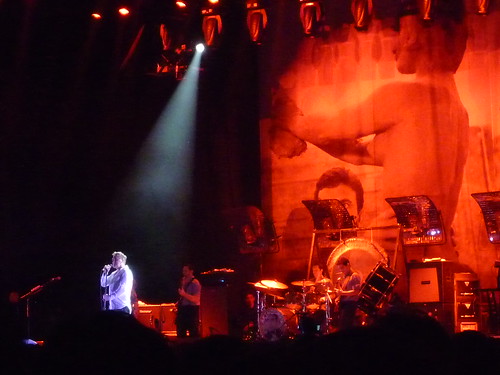
So, if you've never seen him before, or are wearing rose coloured gladioli, you might conceivably think that this is the man at his best. No. Very very far from it. Even in his doldrums of 2001, four years since an album and freewheeling rudderless through a concert existence with no commercial future, Morrissey had with him a supple, strong band he kept, in various forms for 13 long, glorious years. Supported ably by Alain Whyte – the finest foil he had in his solo years, Gary Day, and the versatile Boz Boorer, those years were his glory years. The 1991 Kill Uncle tour was, and remains, probably his single brightest concert period. The fresh, and ravenous, band – and the reborn, bequiffed indie Jesus, roamed the land and conquered all. The screech and howl of a messanic comeback on that tour has never been accurately captured by anyone, and quite unlike anything I have ever experienced any other time in my life. The band leaped out as hungry tigers, and Morrissey himself preened and shone after a five year exile from the stage.
Now – 20 years after – that band a fading memory, and replaced with, by and large thumping, lumpen American sessioneers, that is a memory. Morrissey, who may very well dump band members at the slightest whim, employs these compliant workers as a backing band : only Boz Boorer – sorely underrated and capable of playing anything but chess – demonstrates any flair, or, for that matter subtlety. Compare, if you will, tonights crunching, and disturbingly 1976-Stadium-Rock plod through “This Charming Man” with the original 1983 version, and weep. The subtle dexterity, the deftnes of touch, the class and the verve all absent.
And there are far too many Smiths songs.
Morrissey now represents a curious demographic : the young idealists have been honed into Prime Ministers at direct odds with everything Morrissey ever expressed, into the shell-fund managers. I bet Rebekah Brooks – last known for destroying murder evidence to sell newspapers – has a favourite Smiths song. And I bet it's Moz's disturbingly castrated, mogadon paced, lethargic rendition of “There Is A Light That Never Goes Out”, rendered tonight without passion, without pace. Morrissey recites the words, as he has so long for this song, that divorces the song from meaning. It becomes just words, and music to be sung along to in a big fat field. The song plods on at half-pace, extended into a frankly tedious coda, as Morrissey climbs down to the crowd and shakes the unwashed flesh.
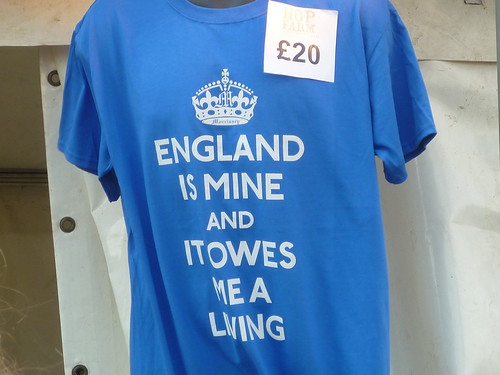
And there are far too many Smiths songs.
Once upon a time – at the birth of his solo career – when his band were capable and had fire, the renditions of “London”, and “Shoplifters Of The World Unite” in 1995 – were aflame with a righteous reclaiming of the body of work. Now, these are tired cover versions. Jesse Tobias, former Red Hot Chilli Pepper, crunches big rock riffs as if he were in any band in the world – not gifted with some of the most glorious material ever committed to the human ear. Solomon Walker – and his brother Matt (ex-Smashing Pumpkin) are disposable parts of a rock lawnmower, running through the songs with little fluency. How Morrissey could have chosen these musicians baffles me, unless they were a reasonably good buy. Even on “Meat Is Murder”, which sees the band run from silence to a deafening roar in seconds as the stage is bathed with blood, these songs are simply nostalgia and karaoke. Memories of memories. And 25 years since the final Smiths songs, there are few left to contest them.
I spend most of “Meat Is Murder”, whilst the band play in blood red strobes and Morrissey intones “Eat – Kill – MURDER”, transfixed by the moments where the self-appointed intensity of the moment is broken by a fairground wheel in a dozen shades of orange and green and blue neon unapologetically breaking out from behind the stage ever few seconds. Eat! Kill! WHEEEEEEEEEE! Eat! Kill! Murd- WHEEEEEEEE!
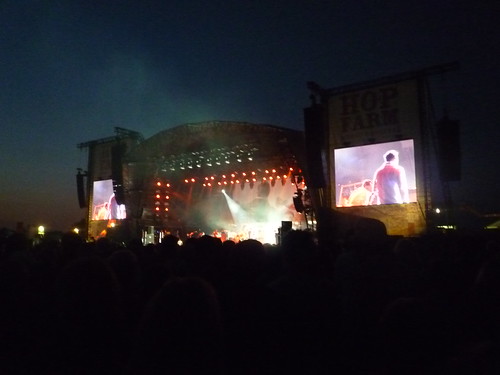
Morrissey may sing these songs wonderfully, but his career, and legacy, deserve better, than being known as a tribute act to himself. For one who never wants to reform The Smiths, Morrissey's choice of songs belies the fact. Maybe he would have preferred The Smiths to quietly kowtow to his ego : but make no mistake, the “band” he had that carried him from 1991 to 2004 has been quietly dismantled for cheaper, more pliable alternatives.
Whilst, thankfully, Morrissey has never sought to return to the “Play An Album In Full” or reformation route, his career has been distinctly nostalgic – it always has been a nostalgia for a mysterious, idealised time of pre-youth, framed before puberty, the world of adults when he was a child, and thus, to an extent, a desire to return and reclaim an innocence – Morrissey has never, thankfully, rested on laurels. Even now, again, without record company backing in a self-funded wasteland waiting for an elusive big deal, Morrissey continues doggedly on clinging to the old ways of sign / deal / album / tour.
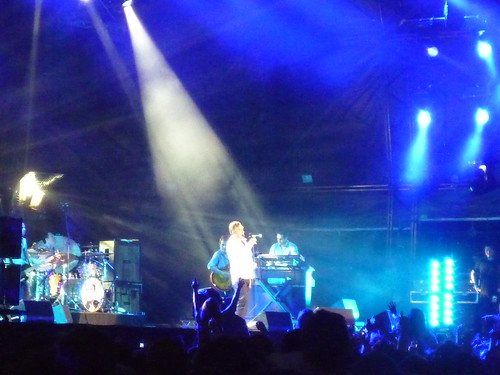
But there are too many Smiths songs.
Wonderful as those songs are, these aren't The Smiths, and the band tackle the songs without flair or attack, turning them into dull cover versions, and punctuating a potentially excitings et with the knowledge that you are never more than 10 minutes away from a butchering of a 25 year old song which is inevitably in the wrong key or tempo or bludgeoned with power chords.
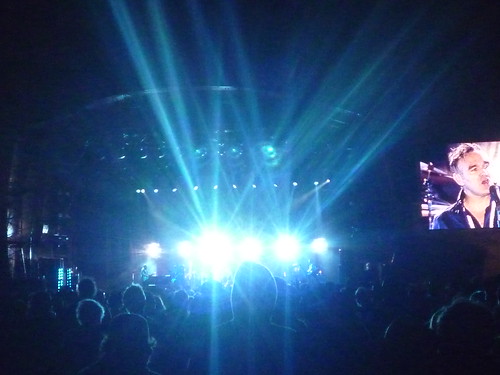
After this though, his band ably and wonderfully perform the solo material. Unlike many of his peers, thankfully, Moz is blessed with an enormous body of work – 11 solo albums and numerous compilations of rarities – though, on the strength of tonight, you may not know it. Some of his finest work is barely referenced, with only one song from most of his records. Whilst it is a lovely moment for the much under-appreciated “Alma Matters” to appear again in setlists after a eleven year absence, think about what is excused for his choices - “The More You Ignore Me”, “Interesting Drug”, “Suedehead”, “Now My Heart is Full” - can anyone say that “You're The One For Me, Fatty” is better than these songs? On the other hand, Morrissey opens with “I Want The One I Can't Have”, and from there, the Hop Farm is in the palm of his hand – if what you want is a set of memories constructed for singing along to in a big field.
To an extent now, Morrissey is a parody of himself. We all become entrenched with age and, for Morrissey and a fragile ego, the vindication enforce the ego and makes the act to an extent, potentially . To start with, Morrissey's weapon was his intelligence. Now it is fear and withdrawl. No one ever tells Morrissey things are bad ideas, like Prince. And therefore, the risk is of a slide into an irrelevancy or a artistic cul-de-sac.Which is why there is a Morrissey song called “You're The One For Me, Fatty”. But years of being proven largely right, and being the one key cog in the Morrissey industry, have made him, even without being aware, even when being himself, a parody of himself.
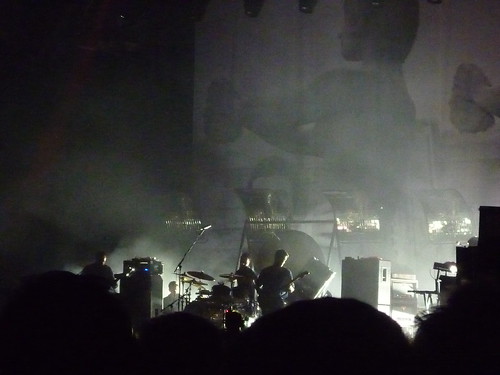
His band, meanwhile, perform the solo songs – especially the later ones they have almost entirely written themselves – such as “You Have Killed Me”, “Irish Blood, English heart”, “First of The Gang To Die”, “I'm Throwing My Arms Around Paris”, with no shortage of belief. It's the older songs, the ones they did not write, that sound not quite authentic.
Perhaps tonight, it's that Morrissey knows his competition is fierce. The rest of the bill is the strongest he has headed in his life. “How the hell do you follow Iggy And The Stooges?” he says. And for the first time, perhaps ever, Morrissey descends from the stage for communion and to press the flesh and shake the hand of his crowd. Normally, to an extent, aloof. Certainly, the stage invasions and euphoria that accompanied the 1991-1995 tours appear to have faded into soft middle age. So instead of the crowd coming to him, tonight – for the first time – Morrissey comes to them : but to an experienced eye, 20 years of Morrissey gigs later, tonight is by no means, the man at his best, or even close to it. If this is close to anything, it's the wilderness years between albums when all Morrissey was, was having becoming unemployed except for occasional live appearances.
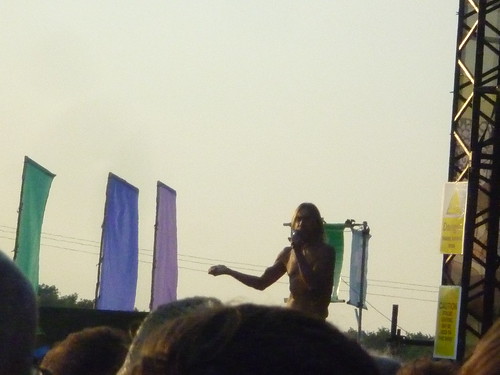
But after Iggy And The Stooges, it is not quite sufficient. Iggy And The Stooges hit the stage at exactly 7.45. Iggy and the band weld their instruments like machine guns, open the big box of rock riffs, and spring out of the trap as if in a war. James Williamson, who appears to have aged as sleekly as a prime rock athelete, effortlessly twirls his fingers. And the field erupts in a sea as “Raw Power” assualts our ears. And it is glorious.
The first half of the set is mostly Williamson-era material (that is, from “Raw Power” and the associated period). There's “Seek And Destroy”. “Gimme Danger”. A stage invasion at Iggys behest. The snake hipped pensioner that is Iggy wisps on stage, commands the stage, prowls the crowd hungrily, and behind the rest of the band offer a thunderingly heavy, monolithic, hulk of pure raw power. By the second half of the set it's a home run, albeit strange that the band perform the never-officially-released “Cock In My Pocket”. Though “1970”, “Funhouse”, “I Wanna Be Your Dog”, “No Fun” convince all. Who can argue with this array of weaponry?
Not even the nincompoop who demands we stop because he's dropped his lipstick will win this one.
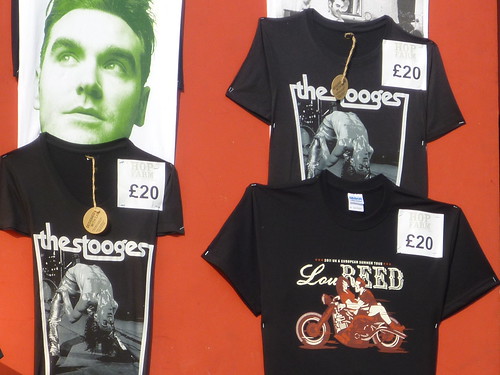
As live acts go, Iggy is rightly considered a god amongst men. He plays harder, faster, and better than bands half his age – and half as alive. How do you follow Iggy And The Stooges? The answer is you don't. They performed with a biting precision few bands ever achieved in their prime, let alone forty years later. Iggy And The Stooges are rock terminators, timeless, ageless, unstoppable – not even death can slay them – they cannot be negotiated with, or bargined with, and will not stop. Ever.
The rest of the bill mind you – strong as it is – fails to inspire or grab. Tim Booth – vocalist from James – arrives fifteen minutes late, and opens with the announcement that he was dropping the best song from his spartan set. Seven songs, and half an hour later, he is gone, having inspired curiousity but no euphoria. His set comprises of material from his three solo albums – which the world neither needed or knew it wanted – and this material is competent but not compelling. Songs rise and fall on innumerate riffs, but melodies and perhaps the most element – the desire, the need to hear this again, the feeling that is music that MUST be made – is missing. He's followed by Blur guitarist Graham Coxon. Coxon's set is boring : monotone indie chugging. Coxon's voice is strained but by no means anything other than someone who must be a singer instead of someone who should be a singer. The riffing and music is a fine maelstrom of sound, but at the core of this, is a lack of songs. Coxon – his stop-start stuttering and rolypoly riffs – is an angry Syd Barrett, shorn of innocence and wonder. It's by no means a small talent, but one that could be channelled and tempered to create greatness. We leave into the sun, and find an acoustic Patti Smith rallying a small army with an assessment of furiously righteous laments. Yes. She does do “Because The Night”.
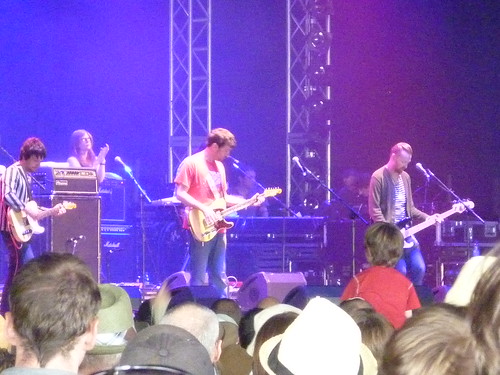
Lou Reed is next. I saw Reed before, when he was in his “Karate Kid III” years, performing largely acoustically with an accompanying meditation master offering interpretative dance to “All Tommorow's Parties”. It was shit then. And it's shit now. Reed leads his mogadon, barely adolescent band – one that compensates for his obvious apathy – as he becomes a sideshow. There's a bloke on stage. Barking about a femme fatale, or something. The delivery is contemptuous. And I've seen Bob Dylan mangle tunes like a seal into a bucket at Roskilde.His band – wonderkid guitarist in his late twenties aside – are jobbing tired session hacks, with the generic shaven headed, huge drummer pounding skins as a human gorilla with the subtlety of a brick and a bored bassist. Reed races impatiently through the songs : through I have no idea why. If he hates performing so much, it's not as if he needs the money. Maybe it's time to stop. Maybe its time to let go. Lou Reed looks bored, and is boring. Whatever muse he had, whatever his once compelling artistic idea was, it's deserted him and we're left with a twitching corpse of once-gender-confused-karaoke. Shiny! Shiny! Boots! Of Leathah!
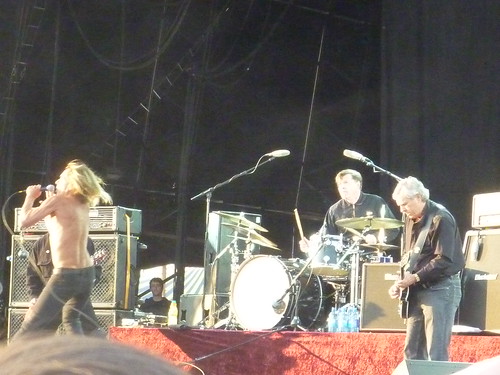
And then Iggy came. And set us free.
Which leaves us to Morrissey. With the legacy of The Smiths a memory of a memory, his solo career at a curious crossroads.His band take his songs, good, bad, ugly – and render them all with the shape of a generic indie thump. Dressed identically, his Sleeperblokes, the gang he desperately wanted when younger, compliantly deliver b-grade mid 90's indielandfill with enthusiasm and skill but no taste. And the songs! He sings them so beautifully, when he can be bothered. The new material is average – just another 3 Morrissey songs to join the 250 or so already in existence – sandwiched between a curious mix of album tracks and occasional hit singles. With so many hits – Morrissey has 35 solo singles and another 18 or so as part of The Smiths – it's a choice of songs that sees most of his 2009 era setlist junked (only four songs were also performed on his most recent tour) – and whilst you can never please everybody all the time, his sets are perverse, and unpredictable. Not helped by a band that mauls classics in different keys or tempos, flattening the glory of “There Is A Light That Never Goes Out” into a huge singalong on a farm, and pretending that “Suedehead”, or even “Something Is Squeezing My Skull” doesn't exist. But Morrissey is iconic now : all he has to do is be, not even do anything, to be Morrissey. Like it or not, Morrissey is becoming an elder statesmen, entering a late period irrelevancy, backed by a band terrified of taking risks, and terrified of the inevitable sack. But maybe it's time to get off the stage. There's little new left in these old tricks for now. Sack the band. Take risks. Be alive again, Morrissey. You are very good at what you do, but what you do isn't very good anymore.
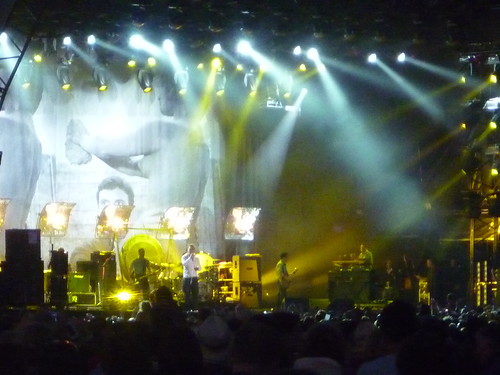
Comments:
<< Home
To some extent I can understand the lumpen power chords on those lovely, delicate Smiths songs.... it's a recognition that, without Marr, they can never sound like that again and it's better to try to claim them as something different. That said, at Glastonbury, I found the riffage on "This Charming Man" in particular to be depressing. Other than that, I thought Moz was on reasonably good form, and it was nice to hear "Almer Matters" although I would rather have heard some of the lush, orchestrated songs from "Vauxhall & I"
Re. the band. I think this current incarnation dates back to just after "Ringleader of the Tormentors" and he still had Gary Day when he did "Quarry" (might be wrong there). Isn't the reason Alain Whyte isn't there any more due to illness?
I'm sure Jesse Tobias is an estimable guitarist, but Johnny Marr he ain't. Who is?
Morrissey may be a nostalgia act these days (and he's raging against the dying of the light) but watching him still gives me the overwhelming sense that they don't make 'em like this any more and we'll never see his like again. Cherish him -- although that doesn't mean put him on a pedestal and be uncritical of all he does, as many are. He's a one off. Always was.
Re. the band. I think this current incarnation dates back to just after "Ringleader of the Tormentors" and he still had Gary Day when he did "Quarry" (might be wrong there). Isn't the reason Alain Whyte isn't there any more due to illness?
I'm sure Jesse Tobias is an estimable guitarist, but Johnny Marr he ain't. Who is?
Morrissey may be a nostalgia act these days (and he's raging against the dying of the light) but watching him still gives me the overwhelming sense that they don't make 'em like this any more and we'll never see his like again. Cherish him -- although that doesn't mean put him on a pedestal and be uncritical of all he does, as many are. He's a one off. Always was.
That's a musical Scorched Earth policy.. Alain Whyte left due to illness and back trouble, but, as far as I can tell when phased out hasn't been visible yet. Jesse Tobias is good at what he does, but what he does isn't good enough for these songs. They don't make them like him anymore... but thats not ALWAYS a bad thing.
Post a Comment
<< Home

